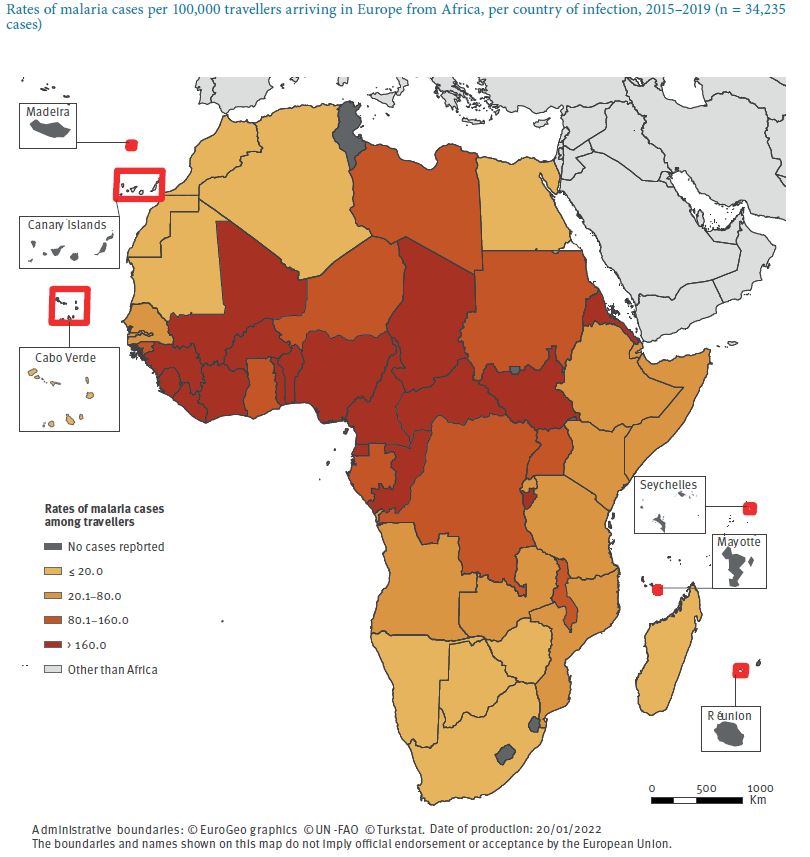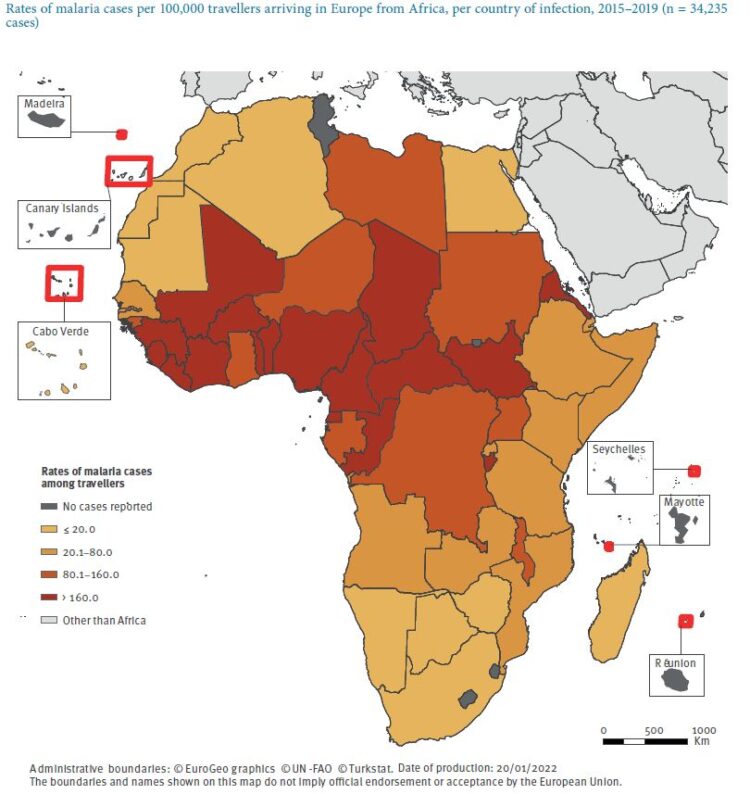So-called arthropod-borne diseases are human illnesses, commonly transmitted by the bite of infected arthropod vectors like ticks, mosquitoes, sandflies, or fleas. Efforts to strengthen disease surveillance in this area across Africa are on-going and supported by the Africa Centres for Disease Control and Prevention (Africa CDC), established in 2017. However, information on circulating pathogens in some African countries is still limited. Using travellers as sentinels for infectious disease surveillance, Gossner et al. [1] assessed travellers’ health data collected in Europe in the attempt to provide actionable information for the Africa CDC.

Credit: Eurosurveillance
So-called arthropod-borne diseases are human illnesses, commonly transmitted by the bite of infected arthropod vectors like ticks, mosquitoes, sandflies, or fleas. Efforts to strengthen disease surveillance in this area across Africa are on-going and supported by the Africa Centres for Disease Control and Prevention (Africa CDC), established in 2017. However, information on circulating pathogens in some African countries is still limited. Using travellers as sentinels for infectious disease surveillance, Gossner et al. [1] assessed travellers’ health data collected in Europe in the attempt to provide actionable information for the Africa CDC.
Malaria most common vector-borne disease among travellers
In their descriptive analysis, Gossner et al. examined travellers’ volume data and arthropod-borne disease cases reported in Europe between 2015 and 2019. For diseases with at least one hundred cases per year, the authors determined the disease-specific travellers’ infection rate (TIR), which they considered as a proxy for the likelihood of infection.
In the study’s timeframe, around 125 million people arrived by commercial airplane from Africa to Europe according to data from the International Air Transport Association (IATA). Most travellers arrived from Northern Africa (79.3 million), mainly from Morocco (31.1 million).
With 34,235 imported cases (TIR = 28.8/100,000 travellers) between 2015 and 2019, malaria was the most common arthropod-borne disease among travellers from Africa to Europe. Most of the cases were confirmed ones (> 99%). As for the blood parasites causing malaria, for 92% (n=31,404) of the reported cases the respective Plasmodium species were identified. Plasmodium falciparum accounted for the majority of them (89%) with the proportion of P. falciparum ranging from 75% for Eastern Africa to 92% for Western Africa.
In comparison, other mosquito-borne infections among travellers from Europe were reported only sporadically during the period studied: dengue (n=956), chikungunya (n=161), Zika virus disease (n=16), West Nile fever infection (n=9), Rift Valley fever (n=4) and yellow fever (n=1). There were no reports on imported cases of Crimean-Congo haemorrhagic fever, plague, or tick-borne encephalitis from Africa.
Complementing local surveillance
Comparing the results across the assessed infections, the malaria TIR was 36 and 144 times higher than the TIR for dengue and chikungunya, respectively. According to Gossner et al., “this reflects the high level of endemicity of the disease and transmissibility of the parasites in a large part of the African continent, the long durations of detectable (untreated) infections (as compared with the arboviral diseases) and the high proportion of cases presenting clinical manifestation making diagnosis likely.”
The authors also observed that the number of imported cases and TIRs were higher for dengue than for chikungunya, which could imply that particularly in touristic areas dengue virus is circulating more widely than chikungunya virus.
While Gossner et al. acknowledge certain limitations of their study, e.g. potential underestimation of the TIR given that not all cases are diagnosed and reported in returning traveller to Europe or the fact that health data from travellers cannot serve as a substitute for local disease surveillance, they also consider that “travellers health data can efficiently complement local surveillance data, particularly when the country or region has a sub-optimal surveillance system. Similarly, travellers might be index cases of yet unrecognised outbreaks.”
—-Ends—-
References/notes to editors:
[1] Gossner Céline M, Hallmaier-Wacker Luisa, Briet Olivier, Haussig Joana M, de Valk Henriette, Wijermans Ariana, Bakonyi Tamas, Madubuko Theresa, Frank Christina, Noel Harold, Abdulaziz Mohammed. Arthropod-borne diseases among travellers arriving in Europe from Africa, 2015 to 2019. Euro Surveill. 2023;28(7):pii=2200270. Available from: https://doi.org/10.2807/1560-7917.ES.2023.28.7.2200270
Journal
Eurosurveillance
DOI
10.2807/1560-7917.ES.2023.28.7.2200270
Method of Research
Data/statistical analysis
Article Title
Arthropod-borne diseases among travellers arriving in Europe from Africa, 2015 to 2019
Article Publication Date
16-Feb-2023
COI Statement
No conflict of interest declared





